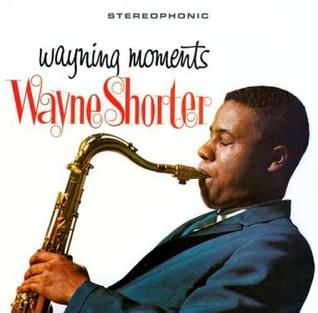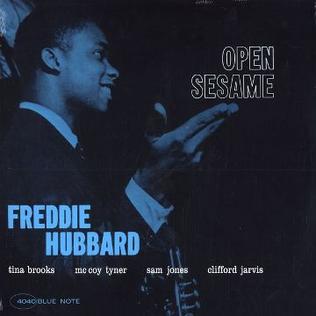Recent listening, current
Archived listening, 2013-2016
Showing posts with label freddie hubbard. Show all posts
Showing posts with label freddie hubbard. Show all posts
Sunday, July 28, 2013
118. Art Blakey and the Jazz Messengers / Soul Finger (1965)
In 1965, the Jazz Messengers were navigating strange seas. The decade was only half finished but had already seen players like Dolphy, Coltrane, and a host of others. On the other hand, it's like the climate inside the Messengers was oblivious to this. Their music continued ahead, business as usual, driven by Blakey's hailstorm of press rolls and weaponized hi-hat pulse. I feel inclined, or almost obligated, to say what been said a thousand times. I suppose when someone mentions the Messengers, that's the image I conjure: the world's best hard bop band, Blakey at the helm. Yet this lineup feels different than other incarnations of the Messengers, even if it's obvious that no two were the same. The soloists take some unexpected corners, and it's an aggressive front line from the word "go" with Freddie Hubbard and Lee Morgan blowing alongside Gary Bartz and, on one track, Lucky Thompson. They're explosive but the charm, for me, comes between John Hicks in the left channel and Victor Sproles in the right. I hear a lot going on there. Unforgettable is the debut of Gary Bartz on alto. This disc might not be a definitive Messengers date, but there are some critically overlooked moments packed between these grooves, and a little jazz history, as well.
Labels:
1965,
art blakey,
freddie hubbard,
gary bartz,
hard bop,
jazz,
jazz messengers,
john hicks,
lee morgan,
limelight,
lucky thompson,
review,
sextet,
soul finger,
verve,
victor sproles
Tuesday, April 30, 2013
97. Wayne Shorter / Wayning Moments (1962)
This album, his last LP on the Vee-Jay label and only his third as a leader, has aged very well. That's quite typical of other titles in the Shorter catalog. But in addition to providing really good listening for 2013, I think Wayning Moments should
be important to listeners for another reason. It demonstrates his
skills as soloist, leader, and composer at an early stage. It's the
prelude to his Blue Note years, a simple portrait of blues and bop
that was perhaps more appropriate to the market Vee-Jay was reaching
than the music Shorter would record for Blue Note. I turn it on and marvel at the growth of the artist from tenor in the Jazz Messengers, to this year's Without a Net. Say anything you like about Wayne Shorter, you cannot ignore the arc, the sweep, of his career in music. Recorded 1961, the sounds contained here are very much in the same vein as Blakey's Jazz Messengers. It's hard bop with both feet in the blues, straight-ahead jazz that is very slick and rendered with virtuosic skill. The band stays tight, the arrangements are concise, and no one takes too many chances. But no one needs to, because they're clearly not trying to do anything of the sort. In the opener, Freddie Hubbard plays alongside Shorter, adding strident Latin overtones to Bonfa and Jobim's "Black Orpheus." Eddie Higgins also gets in some nice choruses on piano, like the one in Shorter's "Dead End," "Callaway Went That-A-Way," or his comping and interplay with Shorter's solo voice in "All of Nothing at All" that is simply magical. Shorter has every other composition credit on the album for a total of four. Sandwiching Shorter's music between piecess by other composers (or maybe it's the other way around?), the album does not feel a single bit uneven, a testament to both the group and the compositions.
Labels:
1961,
1962,
eddie higgins,
freddie hubbard,
hard bop,
jazz,
jymie merritt,
marshall thompson,
quintet,
review,
tenor sax,
tenor saxophone,
trumpet,
vee jay,
wayne shorter,
wayning moments
Saturday, April 20, 2013
87. Bobby Hutcherson / Dialogue (1965)
On Hutcherson's debut as leader, the members of his sextet make as much of an impact as he does. It's a lineup packed with powerful young players of the new jazz, many of whom are noted as leaders in their own right. But they create consistency that rejects the lie that too many cooks will spoil the soup. All compositions are by Andrew Hill, except "Idle While" and "Dialogue," by Joe Chambers. It's a good set, and the material is quite diverse. Like the mambo of "Catta" or free spirit displayed in "Le Noirs Marchant," all are enhanced by the group's diverse musical personalities. Hutcherson and Rivers, for example, play licks that are rhythmically jarring and colored by dissonance. But they're remarkably lyrical soloists, and the places they find musicality can be revelatory. Rivers also brings bass clarinet, flute, and soprano sax along with his tenor, so textures are always changing. The young Freddie Hubbard is also on the record, and his clarion trumpet is heard plainly above the ensemble, an ascendant talent whose first date as leader was just a few months off.
Monday, April 1, 2013
68. Freddie Hubbard / The Artistry of Freddie Hubbard (1962)
This is Hubbard's fifth album as leader, and his first recorded for the Impulse! label. The music is hard bop inside and out, but Hubbard's sextet undergoes some changes with trombone Curtis Fuller, and John Gilmore moonlighting away from the Arkestra. Together they stretch out in some lengthy jams and experimental explorations that lean clearly in the direction of the Impulse! ethos. "Bob's Place," "Summertime," and "The 7th Day" really put eyebrows on the proceedings. The reworking of "Caravan" is interesting, too. Gilmore is especially captivating. Like a musical alchemist, he plays long, sustained notes in lengthy phrases that unmoor the notes from their melodies. On compositions like "The 7th Day" or "Bob's Place" these contrast with the backdrop of the vamp, creating the effect of pure tonal color and presenting the tones themselves in striking relief beside their harmonic relationships. Tommy Flanagan on piano, Louis Hayes does drums, Art Davis bass. I like this side trip from the early Hubbard formula quite a bit.
Tuesday, March 5, 2013
51. Freddie Hubbard / Open Sesame (1960)
I think: Open Sesame. The title says, as if by magic, Freddie
Hubbard has arrived. It's is a very strong debut and an easy mark for
the core collection. We also get a great band. Tina Brooks on tenor really tears it up. On the title track, Brooks sinks his teeth into the riffs, blowing these long, stretchy phrases that step across the bars like hurdles and land back in time when he runs out of breath. He's a good man on ballads, too, like the droopy "But Beautiful." Behind the traps is Clifford Jarvis, two years shy of becoming a Saturnian. His energy, polyrhythmical claptrap and close work with Hubbard's improvisations add depth that is a few cuts above the standard hard bop set. Sam Jones plays big round notes in a sentimental and melodic style which at times reminds me of Ray Brown. He's aided everywhere by McCoy Tyner's drizzling fills and colorfully voiced chords. "Gypsy Blue" has a Latin tinge. The head has a cool arrangement where Hubbard and Brooks play in, and then slightly out of phase, hypnotically swinging it along. Hubbard's centerpiece is the rollicking "All or Nothing at All," where he shows off his chops in wild, flashy runs, rubber fingered flourishes, and big brassy blasts in the upper register. The guy's a natural who learned to improvise before he learned to read, and it shows.
Subscribe to:
Posts (Atom)




